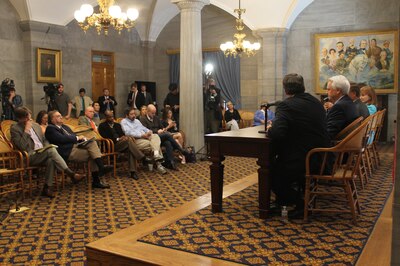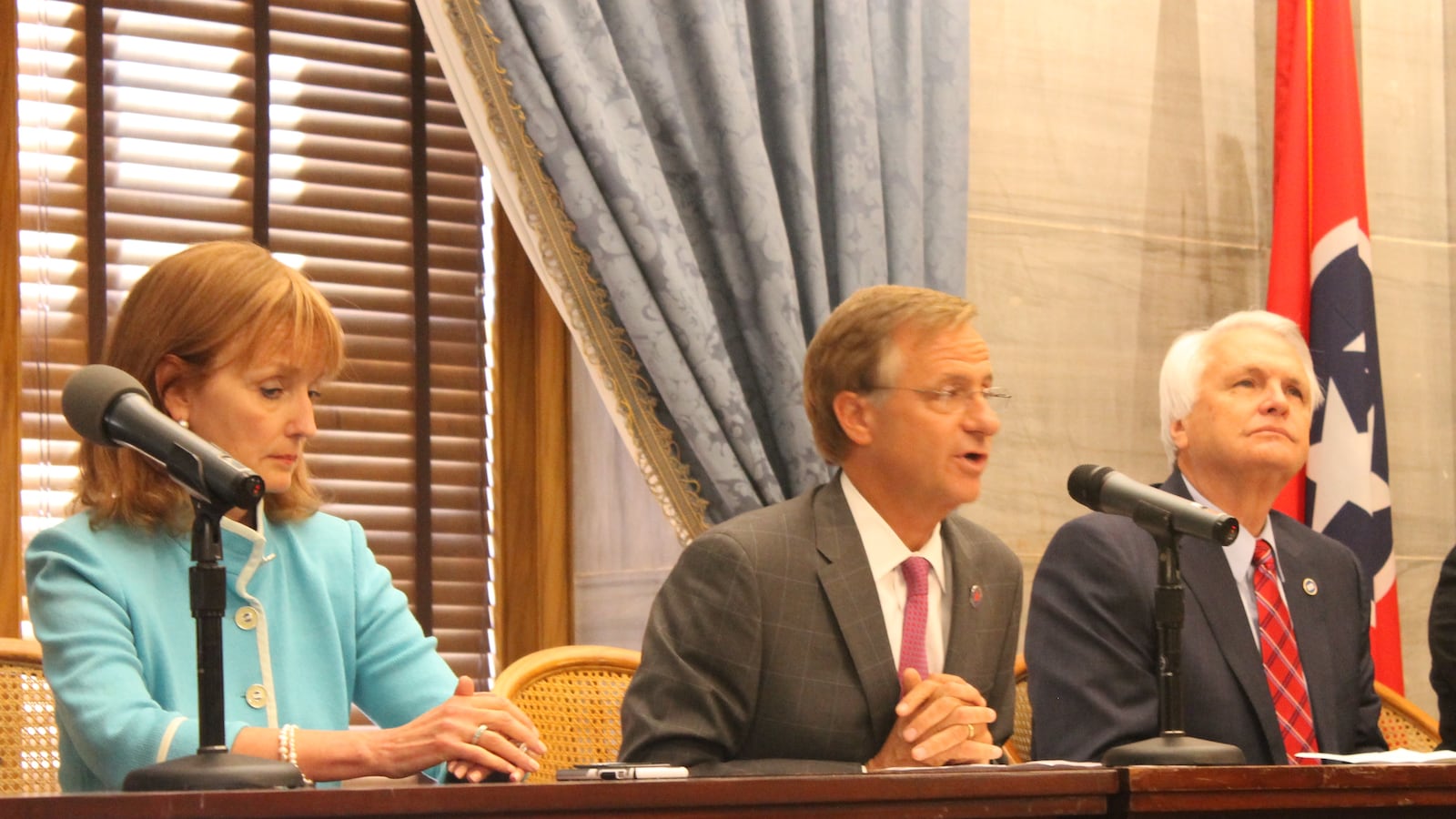Four months after Gov. Bill Haslam told lawmakers that “there is nothing more important to our state than getting education right,” he thanked the legislature for taking his message to heart, citing a $170 million boost in K-12 spending and a surprising consensus on what to do about Common Core.
“The reality is we’re making dramatic improvements in education,” Haslam said Thursday, one day after the legislature wrapped up its session for 2015.
However, legislative leaders of the minority Democratic Party were less celebratory, calling the assembly’s education accomplishments few — and overdue.
“Really, it’s a great start — for what we should have done five years ago,” said Sen. Jeff Yarbro (D-Nashville) of the additional education spending. “I mean, I’m glad to see us put real resources in education, and I applaud the governor and the whole legislature in doing that. But we’re still far behind on this score, and need to keep going.”
Here are some education highlights from the 109th Tennessee General Assembly:
Funding: Noting that most of Tennessee’s new revenue went to K-12 schools, Haslam identified increased education funding as one of the major achievements of the legislature, which approved his education spending plan with virtually no debate. “I challenge you to go around and look at any other state and see what they’re doing in terms of improving funding for education, and I’ll take Tennessee,” Haslam said during a news conference at the state Capitol. Much of the new revenue is earmarked for teacher raises that could amount to up to 4 percent in some districts. But bills that would have helped the state fully fund its Basic Education Program, which arose out of funding lawsuits in the 1990s and early 2000s, never made it to committee vote. Meanwhile, seven school districts in southeast Tennessee are taking the state to court over its level of public education funding, which the lawsuit says is woefully inadequate. In response to the suit, the legislature’s appropriation bill stipulated that school systems may not use state funding to sue the state. “Sneaking into the budget this mechanism to avoid litigation,” Yarbro said, “… was an indication that there are at least a lot of people in the majority (of the legislature) that are worried about the fact that we might not actually be meeting the constitutional obligations that were set out for us.”
Standards: Haslam called academic standards one of the most contentious issues of the session — and called the compromise bill to gradually review and replace Common Core one of the most surprising outcomes. “Entering this, if I had said we’re going to have a discussion about how we’re moving forward on standards in Tennessee, and we’re going to have that kind of consensus, everyone in this room would’ve said ‘I don’t think that could have happened,’” the governor said. The compromise between Common Core opponents, who largely object to the standards for math and English Language Arts because they weren’t locally written, and those who favored the standards because of their academic rigor, adds people appointed by legislative leaders to the governor’s existing standards review process. The bill does not stipulate what changes should occur, but says the state should have new-and-improved standards by 2017-2018, and that the standards should be completed next year so teachers have time to acclimate to them.

Vouchers: Despite strong support from Haslam, House Majority Leader Gerald McCormick (R-Chattanooga) and House Speaker Beth Harwell (R-Nashville), vouchers for low-income students to attend private schools stalled again in a House committee, where Rep. Bill Dunn (R-Knoxville) could not muster the votes for passage. Dunn cited local school district concerns that the program would take away too much funding from public schools. McCormick, who had predicted early in the session that vouchers would pass, said Thursday that a voucher bill will be back next year. “There’s a lot of people who used to be against it who are now for it,” McCormick said. However, the legislature passed a separate voucher bill that may impact up to 18,000 special education students statewide with severe disabilities. If Haslam signs the Individualized Education Act, the measure would allow parents who withdraw their students from public schools to spend state funds on services ranging from physical therapy to private schooling.
Parent trigger: While the Republican-dominated legislature has touted school choice and parent empowerment measures, such momentum did not carry a “parent trigger” bill past the committee level during this year’s legislature. The bill would have allowed parents at Tennessee’s lowest 10 percent of schools to replace administrators and teachers, extend the school day, or turn over the school to a charter operator, with the signature of 51 percent of parents. Though the bill passed the Senate Education Committee, it was pulled off notice in the House by Rep. John DeBerry (D-Memphis), who did not have the necessary support for passage. DeBerry and Parent Revolution, a California-based group that has campaigned for the law in Tennessee for the past two years, said parent trigger will be back.
Teacher evaluations: Responding to concerns voiced by educators, Haslam initiated proposals to alter teacher evaluations, one of the major components of his first-term education agenda. The resulting bill was approved by the legislature and phases in the weight of test scores as the state transitions to its new TNReady assessment, which will be rolled out during the 2015-2016 school year. However, the legislation does not decrease the weight of student achievement data in overall teacher evaluations, which can be up to 35 percent. Under the revisions, scores from the new test will account only for 10 percent of the teacher evaluation score in the 2015-16 school year; 25 percent in 2016-17; and the entire 35 percent in 2017-2018. The policy also is designed to address concerns that teachers of non-tested subjects — such as art and physical education, as well as school counselors — are evaluated solely based on test scores that they don’t directly impact. The soon-to-be law decreases from 25 percent to 10 percent the amount student growth counts in 2015-16, and then to 15 percent in subsequent school years.

Achievement School District: Charter schools meeting student growth expectations in the state-run Achievement School District (ASD) will be able to enroll students who aren’t residentially zoned to the schools under a bill that Haslam is expected to sign. Moving through the legislature, the legislation became a lightning rod about the performance of the ASD — a school turnaround district that is the centerpiece of Tennessee’s education improvement plan of the last five years. The bill’s approval reflected a vote of confidence from lawmakers impressed with and encouraged by the ASD’s results so far. However, its detractors — many of whom filed legislation to limit the district — questioned the adequacy of the ASD’s turnaround track record and argued against increased enrollment flexibility.
So what do you think? In the comments section below, tell us if you think state lawmakers “got education right” this year.
Contact Grace Tatter at gtatter@chalkbeat.org.
Follow us on Twitter: @GraceTatter, @chalkbeattn.
Like us on Facebook.
Sign up for our newsletter for regular updates on Tennessee education news.


